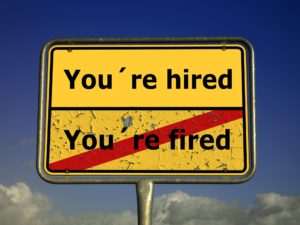Like many states across the nation, Massachusetts is entering a transition period in its response to the Covid-19 pandemic that has been ravaging the U.S. as it has in almost every other part of the world. For the last two months only essential businesses and workplaces have been open with many residents of the state subject to shelter in place rules. As the state opens up, it means that many employees and employers will be forced to recognize a new employment normal. This is likely to cause concern and worry for both employers and employees. This article explores the legal situation regarding possible terminations related to Covid-19.
Massachusetts is an employment at will state
The default situation in Massachusetts, as it is in most states in the country, is that unless there are specific employment contracts that establish the grounds for termination of employment, employers and employees can terminate employment at will. This means that an employer can sack an employee without having to give a reason for doing so. This also applies to an employee who also is able to leave their job without having to give a reason.
If there were no exceptions to this general rule, the reality is that any employee who expresses their dissatisfaction with workplace conditions, e.g. safety provisions in a Covid-19 environment, could be sacked and there would be little that the employee could do about it.
Fortunately, for the genuinely concerned employee there is a range of exceptions to the employment at will rule.
Employment contract exceptions
The main legal arrangement that establishes the terms and conditions of employment is an employment contract. It is really worthwhile for any employee to read through his/her employment contract, assuming that they have one, before and after signing it. An employment contract would usually provide the conditions under which an employer and employee are bound if termination is considered. It may, or may not, alter the right of an employer to terminate an employee’s employment if they express concern about their safety.
Public policy exceptions
Exceptions to termination of employment at will include violations by an employer of specific state or federal public policy rules. An example would be that it is illegal for an employer to sack an employee simply because they have applied for workers’ compensation after a workplace injury or illness.
As part of the reopening of the state strategy implemented by the Massachusetts government, the state government has issued mandatory guidelines for both employers and employees for all workplaces to maintain safe and healthy conditions at work. These guidelines supplement existing federal OSHA regulations requiring employers to provide safe conditions for their employees.
The state’s mandatory public health guidelines include rules about social distancing at work, provision of sanitizer and sanitization of work stations, washing facilities, provision of face masks, the posting of Covid-19 safety at work rules in all work places and ensuring sick employees or those with Covid-19 symptoms stay at home.
While the state’s new mandatory guidelines do not expressly address the subject of wrongful termination if an employee expresses legitimate concern about unsafe conditions at work, termination may be grounds to bring a complaint to the state Attorney General’s Fair Labor Division (FLD). A complaint to the FLD should be followed up by an investigation by a FLD official to find out whether the termination was a breach of state labor laws. If there is no successful resolution of a complaint, the FLD may allow an employee to file a lawsuit against their employer for wrongful termination. It would be almost essential in these circumstances for an employee to get legal help from a Massachusetts employment lawyer if considering filing a lawsuit against their employer.
OSHA and Covid-19 guidelines for workplace safety
The main federal legislation covering safety at work conditions is contained in the Occupational Safety and Health Act of 1970. Provisions under Section 5(a) (1) make it mandatory for employers to provide a safe working environment for their employees. Unfortunately, the clause does not refer specifically to what an employer should do in the current situation where there is a risk of spreading a contagious and potentially fatal respiratory disease. OSHA has published guidelines for four different categories of workers which spell out what sort of safety conditions should be considered by employers, e.g. whether personal protective equipment (PPE) should be provided, but the guidelines are not legally binding.
Wrongful termination due to a violation of anti-discrimination laws
Some employees are more susceptible to the damage that Covid-19 can do than others. As far as workplace provisions are concerned, it could be argued that any employer who does not provide special safeguards for employees (termed ‘reasonable accommodation’ by the EEOC) in these categories while Covid-19 is still a threat could be discriminating against them because of their disability.
It is an offense under both federal and state law for an employer to discriminate against one of their employees because of a disability. Employees who are terminated because they have expressed their specific concerns about safety conditions at work may have grounds to file a complaint with the Equal Employment Opportunities Commission (EEOC) or the state FLD. As with a complaint based on perceived violation of state mandatory safety at work provisions, the complaint should be followed up by officials of the EEOC or FLD. There may be grounds to file a wrongful termination lawsuit against an employer who has violated federal or state anti discrimination legislation.
The new normal
The Sars-Cov-2 virus is not going to go away anytime soon and many public health measures will need to remain in place in work places as they will elsewhere, probably until an effective vaccine or at least an effective cure is developed. It is of no benefit to employers not to provide safe conditions at work for their employees and the vast majority of employers will be just as conscious of this as their employees. If a workplace becomes the origin of a new cluster of Covid-19, it could face closure and suffer severe financial set-back as a consequence.
Contact the Law Office of Richard Mucci in Winchester, MA to speak to an experienced employment lawyer to discuss legal options.


